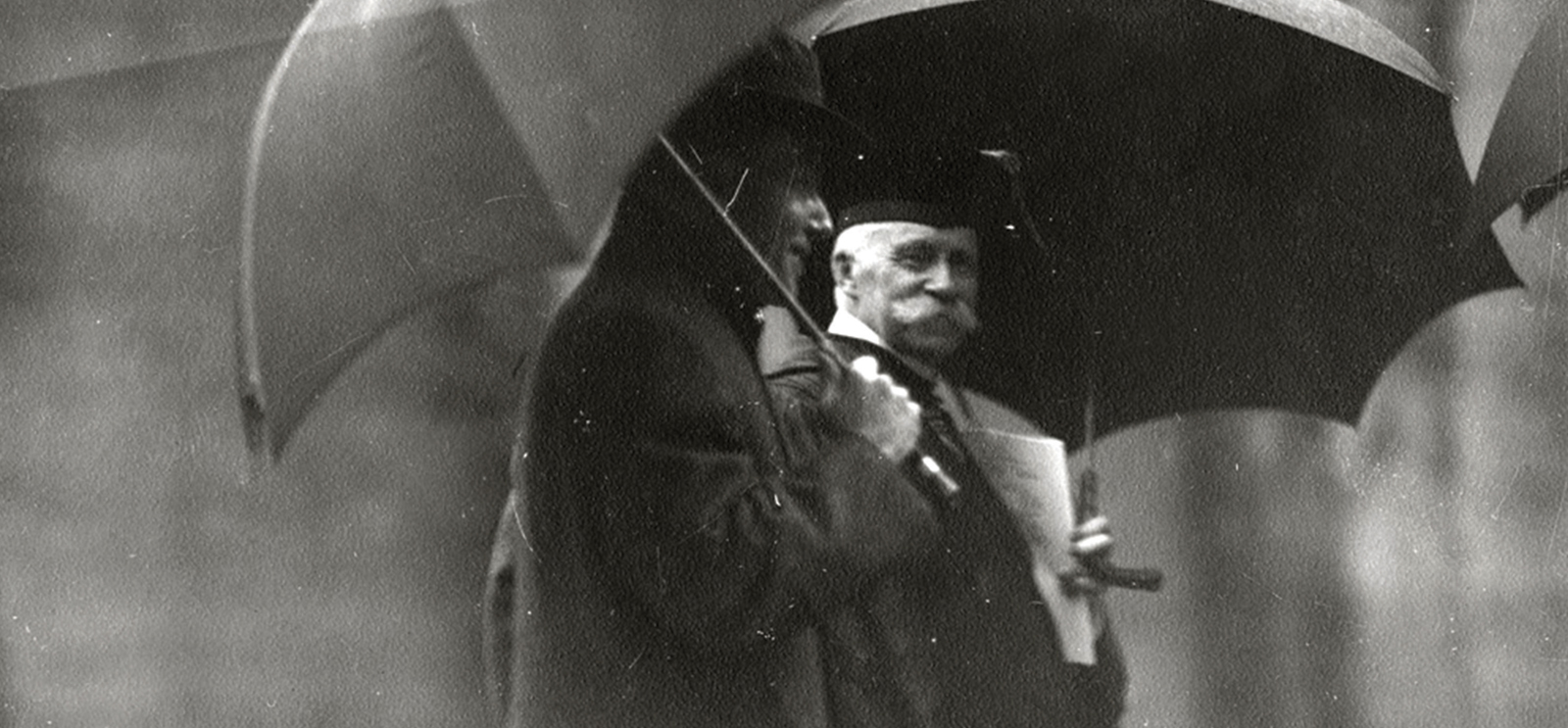
Evolution of a division
Celebrating the social sciences in a milestone year.
As the University of Chicago celebrates its 125th year, 2015 also marks the 85th anniversary of the Division of the Social Sciences. The Division emerged from a collection of autonomous departments to provide a single institutional structure for all social sciences education and research at the University, advancing the work of students and scholars across a broad range of specialties and approaches.















1890
The University of Chicago is founded, with plans for faculty and students to be grouped into four undergraduate Colleges and eight schools. Early departments were designed to function independently, each accountable to a senate including faculty serving as department heads.
1892
[[{"type":"media","view_mode":"media_original","fid":"3228","attributes":{"alt":"","class":"media-image","height":"220","typeof":"foaf:Image","width":"500"}}]] The Department of Sociology is established with Albion Small (above, left) as head professor. Small plays a leading role in defining sociology as an academic discipline and is followed by generations of students and colleagues who pioneer new methodologies in sociology, including the study of urban life, demography, and social structures. Frederick Starr (above, right) joins the faculty and the Department of Anthropology is founded. Its programs of study imbue students with a foundation in the history and principles of social and cultural theory. Noted UChicago anthropologists range from primatology expert Russell H. Tuttle to Judith B. Farquhar, AM’75, AM’79, PhD’86, whose work focuses on contemporary China.
1893
[[{"type":"media","view_mode":"media_original","fid":"3219","attributes":{"alt":"","class":"media-image","height":"188","typeof":"foaf:Image","width":"500"}}]] The Department of Psychology is founded (above), originally known as the Laboratory for Psychology. True to the Division’s interdisciplinary nature, many faculty members serve on more than one of the department’s programs in cognition, developmental psychology, integrative neuroscience, and social psychology.
1897
[[{"type":"media","view_mode":"media_original","fid":"3220","attributes":{"alt":"","class":"media-image","height":"233","typeof":"foaf:Image","width":"500"}}]] The Department of History is created, developing into a leader in cultural and intellectual history, interdisciplinary and comparative history, and international history. Its faculty includes Pulitzer Prize winners John Hope Franklin (above) for George Washington Williams: A Biography (University of Chicago Press, 1985) and Bernadotte E. Schmitt for The Coming of the War, 1914 (C. Scribner’s Sons, 1930).
1900
[[{"type":"media","view_mode":"media_original","fid":"3221","attributes":{"alt":"","class":"media-image","height":"197","typeof":"foaf:Image","width":"500"}}]] The Department of Political Science opens, setting the stage for its emergence as a leader in the study of government and politics. Former teachers in the department include Harry Pratt Judson and authority on American social and political issues Charles E. Merriam (above).
1925
[[{"type":"media","view_mode":"media_original","fid":"3222","attributes":{"alt":"","class":"media-image","height":"202","typeof":"foaf:Image","width":"500"}}]] The Department of Economics is established. Its faculty and students, including Margaret Reid, PhD’31 (above), a professor in the department from 1952 to 1961, have advanced our understanding of society, spearheading the study of ideas ranging from econometrics to human capital.
1929
[[{"type":"media","view_mode":"media_original","fid":"3223","attributes":{"alt":"","class":"media-image","height":"198","typeof":"foaf:Image","width":"500"}}]] The Social Science Research Building opens (shown above at a conference honoring the 10th anniversary of its dedication). Although the building houses individual scholars and their research, it does not house their departments as administrative entities, foreshadowing a shift toward a new approach to academic governance that looks beyond traditional departments as scholarly units.
1930
The Board of Trustees votes to restructure the University into the four divisions, the College, and the professional schools. By grouping the previously semisovereign departments under the leadership of a division, Robert Maynard Hutchins hopes to encourage divisional cultures of interdisciplinary educational work. The Committee on Child Development is created. Ten years later its title is updated to the Committee on Human Development, reflecting the growth in research interest (the committee becomes the Department of Comparative Human Development in 2006). This academic year the department celebrates its 75th anniversary.
1931
[[{"type":"media","view_mode":"media_original","fid":"3224","attributes":{"alt":"","class":"media-image","height":"203","typeof":"foaf:Image","width":"500"}}]] President Hutchins appoints Beardsley Ruml, PhD’17 (above), as the first full-time dean of the Division of the Social Sciences. An educator, executive, and adviser to commerce, industry, and government, Ruml personifies the Division’s new collaborative, interdisciplinary spirit. He leaves UChicago in 1934 to become the treasurer of Macy’s Department Store in New York City.
1938
The Division establishes the Master of Arts Program in the Social Sciences (MAPSS). Today students select from courses throughout the social sciences to personalize their programs of study.
1941
[[{"type":"media","view_mode":"media_original","fid":"3225","attributes":{"alt":"","class":"media-image","height":"194","typeof":"foaf:Image","width":"500"}}]] The Committee on Social Thought is founded by a group of faculty (including John U. Nef Jr. shown above with his father) to promote deeper understanding of the fundamental issues that govern the social sciences, where students research important classic and modern texts before concentrating on a specific dissertation topic. The National Opinion Research Center (NORC) is created as a wartime opinion polling organization. Since then, NORC’s standard-setting data collection and analytical tools have enriched public policy debate and decision making by creating a knowledge base to generate effective solutions to social problems. Over its history, NORC’s directors have included Social Sciences faculty, such as former dean Norman Bradburn, AB’52, now a senior fellow there.
1960s onward
The Division of the Social Sciences facilitates the development of interdisciplinary institutes and research centers, such as- the Center for Middle Eastern Studies (1965);
- the Institute for Mind and Biology (1988);
- the Center for the Study of Race, Politics, and Culture (1994);
- the Center for the Study of Gender and Sexuality (1996);
- the Becker Friedman Institute for Research in Economics (2011).

2012
[[{"type":"media","view_mode":"media_original","fid":"3226","attributes":{"alt":"","class":"media-image","height":"195","typeof":"foaf:Image","width":"500"}}]] The Neubauer Collegium for Culture and Society is established as a collaboration between the Division of the Social Sciences and the Humanities to advance student and faculty investigations of larger-scale questions. In 2015 it moved into the former Meadville Theological Seminary.
